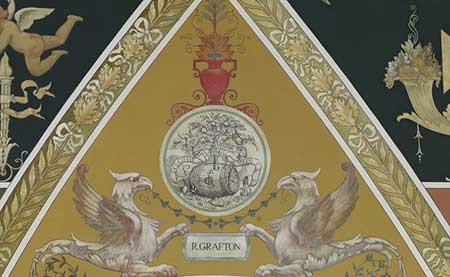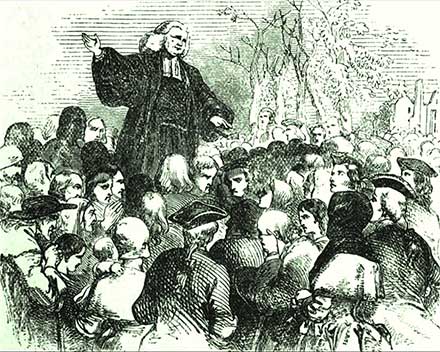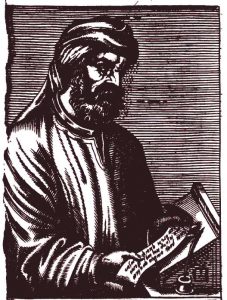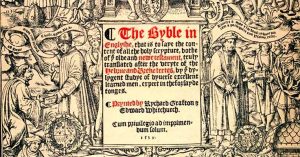Roy Stults has studied Christian theologians’ attempts from the first century of the church until recent times to explain the eternal significance of persecution and to appeal to persecutors for fair play. We present part one of his work as a downloadable PDF. Continue reading “Download “A Theology of Persecution””
Grafton learns the cost of Bible printing

The early printers of the Bible incurred great risks. Richard Grafton and Edward Whitchurch, together with Miles Coverdale, were entrusted to arrange for the printing of Thomas Mathew’s translation. The work was given to the printers in Paris, as the English printers were not very highly esteemed. The book was nearly completed when the Inquisition effectually stopped the further progress of the work by seizing the sheets, and Grafton with his companions were forced to flee. Richard Grafton and Whitchurch contrived to obtain their types from Paris, and the Bible was completed in 1539. Thus they became printers themselves, and as a reward for his labor, when the Roman Catholics again became rulers in high places, Richard Grafton was imprisoned. Continue reading “Grafton learns the cost of Bible printing”
George Whitefield’s Theology of Persecution

George Whitefield was a well-known evangelist during the Evangelical revival in England in the eighteenth century, a co-laborer at times with John and Charles Wesley. Although he did not suffer martyrdom, he suffered ridicule and knew what it was to be excluded from pulpits. Therefore he could speak first hand of persecution. One of his more famous sermons was titled, “Persecution Every Christian’s Lot.” In it he presented a biblical perspective on Christian suffering.
Continue reading “George Whitefield’s Theology of Persecution”Origen’s take on persecution

Origen was the son of a martyr and himself suffered imprisonment and torture late in life. A teacher and theologian, he wrote on persecution as one who had witnessed it and who was prepared to experience it. Although he suffered for his faith, contemporary church leaders condemned some of his teachings because they veered into heretical territory. Continue reading “Origen’s take on persecution”
Sentenced to Siberia
Basil Malof (born William Fetler—he changed his name because Fetler had been forced on his grandfather by German occupiers) was a successful Protestant evangelist in Petrograd (St. Petersburg), and publisher of the first religious journal in Latvia, Kristigais Vestnesis (Christian Herald). Converted at fifteen, he was baptized at night because the Orthodox Church persecuted evangelicals. Continue reading “Sentenced to Siberia”
Elisha Paine and the Freedom to Worship
When Elisha Paine preached as a Baptist, Massachusetts authorities threw him into a dirty prison at Worcester for unlicensed preaching (February 1743). He refused to post bond, believing to do so was to comply with an unbiblical and corrupt system. After his release in May, he continued to preach in that area for two weeks, then preached throughout New England from July into December. By the end of the year had given over 240 sermons. Continue reading “Elisha Paine and the Freedom to Worship”
Fifty Captives Freed for a Blind Man
In July 1900, Boxers martyred “Blind Chang” at Chaoyang, China.
Formerly an alcoholic, thief, gambler, and member of the notorious gang known as Vegetarians, he had become blind after expelling his wife from their home and forcing his daughter into prostitution. He made his way to a mission station where he was given a place to stay. There he heard the gospel and was transformed by the power of Christ. Continue reading “Fifty Captives Freed for a Blind Man”
Tertullian’s Thought on Persecution and Martyrdom

[Imaginary portrait of Tertullian.]
[Adapted from text by Roy Stults from his unpublished Historical Perspectives on a Theology of Suffering, Persecution, and Martyrdom] Tertullian was a prolific Christian writer of the early third century—an apologist (defender of the faith) and theologian. (Among his contributions to theology was the term “Trinity” to explain the Bible’s teaching on Father, Son, and Holy Spirit.) Persecution and martyrdom were often discussed in his apologetic writings. He shared some themes of earlier apologists but expanded the literature by introducing new themes that he wove into a unique argument to meet the situation of his day. Continue reading “Tertullian’s Thought on Persecution and Martyrdom”
The Price Some Paid for the Bible

[Master of François de Rohan (fl. from 1525 until 1546), Title page from the Great Bible published by Grafton and Whitchurch in 1539—public domain, wikimedia File:GreatbibleI.jpg]
Ditchfield, in Books Fatal to their Authors, mentions several Bible translators who paid dearly for their efforts. One translator who escaped punishment by the skin of his teeth was Arias Montanus, who produced a Polyglot Bible at the command of King Philip II of Spain, but was denounced for it to the pope because he had strayed from the Latin Vulgate. Montanus pleaded his case in Rome where the pope eventually pardoned him. His work, however, was placed on the Index Expurgatorius to which he had, in his day, added others’ works. Continue reading “The Price Some Paid for the Bible”
A Syrian priest held hostage by Isis
Although three years old, this account in The Christian Post of Father Jacques Murad, a Christian Syrian priest, is interesting as an example of the threats Christians experience in the Mid East. ISIS Hostage Feels “Born Again” After Witnessing Christian Captives’ Strong Faith. He tells of hundreds of Christians who endure captivity and risk death for refusing to convert to Islam.
